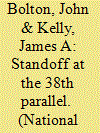| Srl | Item |
| 1 |
ID:
080143


|
|
|
|
|
| Publication |
2007.
|
| Summary/Abstract |
Since North Korea is one of the world's most enigmatic societies, it is difficult to understand precisely the factors determining its policies. The prevailing power structure, the primary political considerations, and the stability of the current order are each subject to question. Meanwhile, a history of relations between the United States and North Korea reveals repeated movements forward followed by renewed breakdowns. In general terms, China is a crucial actor as the North's chief economic and strategic supporter, with South Korea also vitally important. Russia currently plays a limited role, and relations between Japan and North Korea are hostile. At the close of 2006, negotiations are once again underway but with no agreements reached. Thus, it is difficult to be optimistic about an early resolution of the key issues despite some favorable signs
|
|
|
|
|
|
|
|
|
|
|
|
|
|
|
|
| 2 |
ID:
080146


|
|
|
|
|
| Publication |
2007.
|
| Summary/Abstract |
This article addresses why small powers initiate aggressive bargaining with great power allies and adversaries despite the risk of provocation. Although the cause of such behavior is usually attributed to the regime type or the "irrationality" of an aggressive small power, this article explores how a system-level factor affects incentives for a small power to conduct aggressive bargaining. In so doing, I develop a theory of asymmetric aggressive bargaining, which shows that a small power's high security dependence upon its ally or adversary makes its use of aggressive bargaining rational. The empirical analysis suggests that the proposed theory effectively explains changes in North Korea's policies toward the United States and the Soviet Union after the Korean War
|
|
|
|
|
|
|
|
|
|
|
|
|
|
|
|
| 3 |
ID:
084340


|
|
|
|
|
| Publication |
2008.
|
| Summary/Abstract |
With a possible change of leadership in North Korea, in TNI's cover story former top officials John Bolton and James Kelly debate Pyongyang's nuclear future.
|
|
|
|
|
|
|
|
|
|
|
|
|
|
|
|